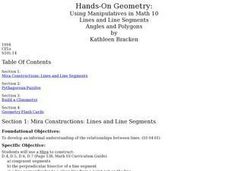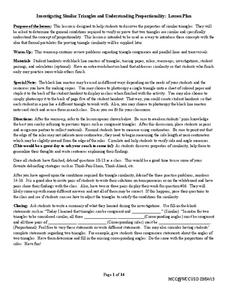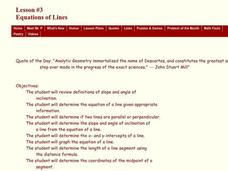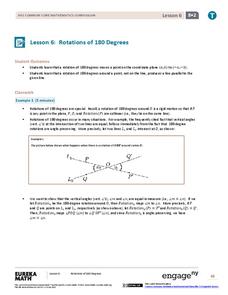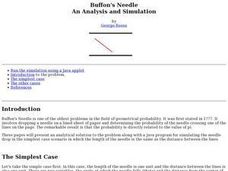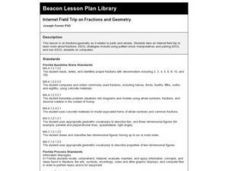Curated OER
Measuring the Earth
Students use principles of geometry to measure the circumference of the Earth. In this applied geometry lesson, students use mathematics to determine scientific information. They make measurements, calculate the central angle, and...
Curated OER
Hands-On Geometry
Tenth graders construct a variety of geometric shapes and designs using a Mira, Clinometer and Geometry Flash Cards. They complete a worksheet.
West Contra Costa Unified School District
Investigating Similar Triangles
Let your use of the resource be in proportion to its usefulness. Pupils investigate similar triangles by measuring side lengths and considering given angle measures. The results of the investigation help develop generalizations about...
Curated OER
Equations of Lines
Students classify lines, slopes and shapes. In this calculus lesson, students calculate the midpoint, segment and equation of a circle. They also review what a slope and angle of inclination is.
Curated OER
Geometry: Lesson 1: Points, Lines, Segments, Angles
Fourth graders examine the concepts of, draw, and label points, lines, segments, and angles, They draw, label, and identify horizontal, vertical, intersecting, parallel, and perpendicular lines. They complete an associated worksheet that...
EngageNY
Rotations of 180 Degrees
What happens when rotating an image 180 degrees? The sixth lesson in the series of 18 takes a look at this question. Learners discover the pattern associated with 180-degree rotations. They then use transparency paper to perform the...
Curated OER
Contructions and Conjectures
Students make constructions and conjectures. In this geometry lesson, students construct right, acute and obtuse angles using a straight edge and a protractor. They investigate parallel lines and the angles formed by the angles.
Curated OER
Measurement
Fifth graders measure specified distances when given perpendicular lines. For this measurement lesson plan, 5th graders draw the lines themselves.
Curated OER
Buffon's Needle An Analysis and Simulation
If you dropped a needle on a lined sheet of paper what is the probability that the needle will cross one of the lines on the page? Surprise your class with how calculating this probability can approximate pi. This question is known...
Curated OER
Corresponding Sides and Angles of Similar Triangles
Students differentiate between corresponding sides ad angles of two triangles. In this geometry lesson, students identify the differences as well as the similarities between two triangles. They differentiate between similar and...
Curated OER
Lines and Angles
Students explore Geometry with Twizzlers Candy, pipe cleaners, paper, pencils, and protractors. They manipulate these items to create different angles introduced by the teacher.
Curated OER
Geometric Lines: Parallel / Transversal / Perpendicular
Students in grade 7 and 8 work on outcomes related to spatial sense and geometric concepts, properties, and relationships. The lesson integrates technology and helps students be exposed to multimedia.
Curated OER
Geoboard Ideas
Learners build polygons on their geoboards. In this geometry lesson plan, students build and then draw it on paper and label it. Learners then switch with a partner to try an make a symmetrical shape.
Curated OER
Constructing Perpendicular Bisectors
Tenth graders investigate parallel lines and the angles formed when cut by a transversal. In this geometry lesson, 10th graders construct perpendicular lines and discuss midpoint, segments and perpendicular bisectors. They relate...
Curated OER
Math: A Geometric Neighborhood
Students, as a final project, draw a picture of their ideal neighborhood on a sunny day. In addition to the sun, their drawings include homes, trees, streets, and selected objects. Each object in their drawing has a written description...
Curated OER
Internet Field Trip on Fractions and Geometry
Students take an Internet field trip to research fractions. ESOL strategies include using pattern block manipulatives and pairing ESOL and non-ESOL students on computers.
Curated OER
Angles, Parallel Lines, and Polygons
Students examine how to investigate polygons using an instrument of their own construction. They should be able to prove the general formula for the number of degrees in any polygon (including a triangle). Finally they investigate an...
Texas Instruments
Investigating Segments in a Quadrilateral
Investigate the properties of the shape formed by connecting the midpoints of adjacent sides of a quadrilateral. In this properties of the shape formed by connecting the midpoints of adjacent sides of a quadrilateral lesson, high...
Curated OER
Side Splitter Triangles
Students investigate the side splitter theorem. In this geometry lesson, students estimate and solve problems dealing with ratios and proportions. They identify angles created by lines that are parallel.
Alabama Learning Exchange
Coordinate Geometry
Where do the coordinates lead? As children brainstorm ways to find the location of different buildings, they learn about coordinate points and how to use them to locate areas on a grid or map. They practice using ordered pairs by playing...
EngageNY
Definition of Reflection and Basic Properties
Discover the results of reflecting an image. Learners use transparency paper to manipulate an image using a reflection in this fourth lesson plan of 18. They finish by reflecting various images across both vertical and horizontal lines.
EngageNY
Mid-Module Assessment Task - Geometry (Module 1)
How do you prepare class members for the analytical thinking they will need in the real world? An assessment requires the higher order thinking they need to be successful. The module focuses on the concept of rigid transformations...
Curated OER
Exploring Geometric Figures
Tenth graders explore mathematics by participating in hands-on daily activities. Learners identify a list of different shapes and classify them by shape, size, sides and vertices. They utilize tangrams and geometric pieces to gain...
Curated OER
Exploring Geometric Patterns and Relationships
Sixth graders explore different geographic relationships in like drawing lines, rays, and parallelograms. This lesson could be used for review because it covers more than one concept. The students should have prior knowledge.

